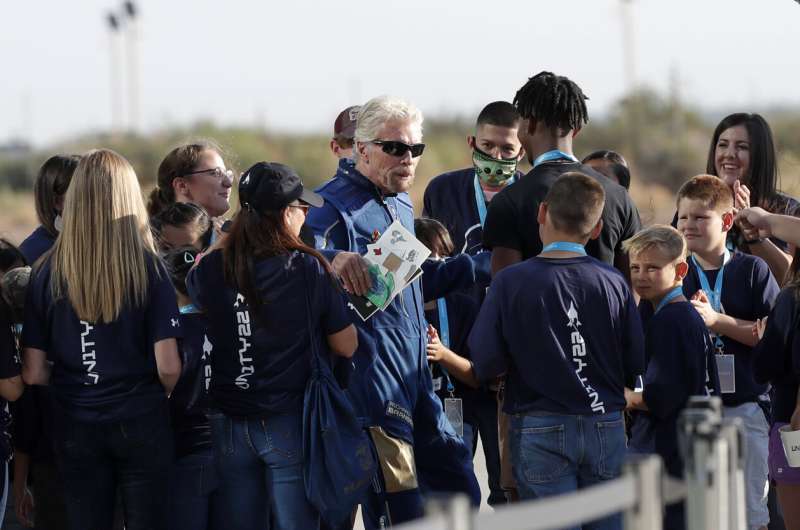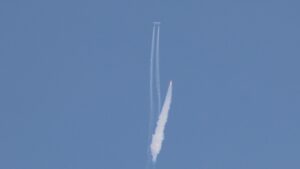OSU drone expertise is supporting the exploration of Earth and the Final Frontier
Monday, 12 July 2021 05:10 As a descendent of pioneers who crossed the Plains 150 years ago to establish a new life in what was then referred to as The Oklahoma Territory, it's ironic that the work that I and others in the State of Oklahoma are doing today related to Unmanned Aerial Systems (UAS) has placed the State back at the center of what can best be described as the new "wild west of aviation."
Although many S
As a descendent of pioneers who crossed the Plains 150 years ago to establish a new life in what was then referred to as The Oklahoma Territory, it's ironic that the work that I and others in the State of Oklahoma are doing today related to Unmanned Aerial Systems (UAS) has placed the State back at the center of what can best be described as the new "wild west of aviation."
Although many S Last Tianlian I satellite placed in orbit
Monday, 12 July 2021 05:10 China launched the last satellite in its Tianlian I relay spacecraft series late on Tuesday night, which also marked the finale of the country's DFH-3 satellite platform.
A Long March 3C carrier rocket blasted off from the Xichang Satellite Launch Center in Sichuan province at 11:52 pm and then placed the Tianlian I-05 satellite into a geostationary orbit, said China Aerospace Science and
China launched the last satellite in its Tianlian I relay spacecraft series late on Tuesday night, which also marked the finale of the country's DFH-3 satellite platform.
A Long March 3C carrier rocket blasted off from the Xichang Satellite Launch Center in Sichuan province at 11:52 pm and then placed the Tianlian I-05 satellite into a geostationary orbit, said China Aerospace Science and Virgin Galactic, Branson laud SpaceShipTwo flight “beyond my wildest dreams”
Sunday, 11 July 2021 21:13
SPACEPORT AMERICA, N.M. — Virgin Galactic and its founder, Richard Branson, hailed a successful test flight by the company’s SpaceShipTwo suborbital spaceplane that carried him and five others to suborbital space, but offered few new details about the company’s future plans.
'Experience of a lifetime': Billionaire Branson achieves space dream
Sunday, 11 July 2021 15:23 British billionaire Richard Branson flew into space Sunday aboard a Virgin Galactic vessel, a voyage he described as the "experience of a lifetime" - and one he hopes will usher in an era of lucrative space tourism.
"Congratulations to all our wonderful team at Virgin Galactic for 17 years of hard, hard work to get us this far," he said during a live feed as the VSS Unity spaceship glided
British billionaire Richard Branson flew into space Sunday aboard a Virgin Galactic vessel, a voyage he described as the "experience of a lifetime" - and one he hopes will usher in an era of lucrative space tourism.
"Congratulations to all our wonderful team at Virgin Galactic for 17 years of hard, hard work to get us this far," he said during a live feed as the VSS Unity spaceship glided Virgin Galactic spaceship carrying Branson touches down
Sunday, 11 July 2021 15:23 A Virgin Galactic spaceship carrying Richard Branson touched down Sunday after a voyage the British billionaire called an "experience of a lifetime."
"Congratulations to all our wonderful team at Virgin Galactic for 17 years of hard hard work to get us this far," he said during a live feed as the VSS Unity spaceship glided back to Spaceport America in New Mexico.
It reached a peak al
A Virgin Galactic spaceship carrying Richard Branson touched down Sunday after a voyage the British billionaire called an "experience of a lifetime."
"Congratulations to all our wonderful team at Virgin Galactic for 17 years of hard hard work to get us this far," he said during a live feed as the VSS Unity spaceship glided back to Spaceport America in New Mexico.
It reached a peak al British billionaire Branson takes off for space
Sunday, 11 July 2021 15:23 Billionaire Richard Branson took off Sunday from a base in New Mexico aboard a Virgin Galactic vessel bound for the edge of space, a voyage he hopes will lift the nascent space tourism industry off the ground.
A massive carrier plane made a horizontal take-off from Spaceport, New Mexico at around 8:40 am Mountain Time (1440 GMT) and will ascend for around an hour to an altitude of 50,000 fee
Billionaire Richard Branson took off Sunday from a base in New Mexico aboard a Virgin Galactic vessel bound for the edge of space, a voyage he hopes will lift the nascent space tourism industry off the ground.
A massive carrier plane made a horizontal take-off from Spaceport, New Mexico at around 8:40 am Mountain Time (1440 GMT) and will ascend for around an hour to an altitude of 50,000 fee Billionaire Richard Branson reaches space in his own ship
Sunday, 11 July 2021 15:20
Swashbuckling entrepreneur Richard Branson hurtled into space aboard his own winged rocket ship Sunday in his boldest adventure yet, beating out fellow billionaire Jeff Bezos.
The nearly 71-year-old Branson and five crewmates from his Virgin Galactic space tourism company reached an altitude of about 53 miles (88 kilometers) over the New Mexico desert—enough to experience three to four minutes of weightlessness and see the curvature of the Earth—and then safely glided home to a runway landing.
Branson flies to edge of space on SpaceShipTwo
Sunday, 11 July 2021 14:45
SPACEPORT AMERICA, N.M. — Virgin Galactic founder Richard Branson and five other people flew to the edge of space on the company’s SpaceShipTwo suborbital vehicle July 11, the culmination of an effort that started nearly 17 years ago.
Scientists solve 40-year mystery over Jupiter's X-ray aurora
Sunday, 11 July 2021 10:39 A research team co-led by UCL (University College London) has solved a decades-old mystery as to how Jupiter produces a spectacular burst of X-rays every few minutes.
The X-rays are part of Jupiter's aurora - bursts of visible and invisible light that occur when charged particles interact with the planet's atmosphere. A similar phenomenon occurs on Earth, creating the northern lights, but
A research team co-led by UCL (University College London) has solved a decades-old mystery as to how Jupiter produces a spectacular burst of X-rays every few minutes.
The X-rays are part of Jupiter's aurora - bursts of visible and invisible light that occur when charged particles interact with the planet's atmosphere. A similar phenomenon occurs on Earth, creating the northern lights, but Goldilocks planets 'with a tilt' may develop more complex life
Sunday, 11 July 2021 10:39 Planets which are tilted on their axis, like Earth, are more capable of evolving complex life. This finding will help scientists refine the search for more advanced life on exoplanets. This NASA-funded research is presented at the Goldschmidt Geochemistry Conference.
Since the first discovery of exoplanets (planets orbiting distant stars) in 1992, scientists have been looking for worlds wh
Planets which are tilted on their axis, like Earth, are more capable of evolving complex life. This finding will help scientists refine the search for more advanced life on exoplanets. This NASA-funded research is presented at the Goldschmidt Geochemistry Conference.
Since the first discovery of exoplanets (planets orbiting distant stars) in 1992, scientists have been looking for worlds wh Icequakes likely rumble along geyser-spitting fractures in Saturn's icy moon Enceladus
Sunday, 11 July 2021 10:39 Tidal stresses may be causing constant icequakes on Saturn's sixth largest moon Enceladus, a world of interest in the search for life beyond Earth, according to a new study. A better understanding of seismic activity could reveal what's under the moon's icy crust and provide clues to the habitability of its ocean.
Enceladus is about 500 kilometers in diameter and almost entirely covered in
Tidal stresses may be causing constant icequakes on Saturn's sixth largest moon Enceladus, a world of interest in the search for life beyond Earth, according to a new study. A better understanding of seismic activity could reveal what's under the moon's icy crust and provide clues to the habitability of its ocean.
Enceladus is about 500 kilometers in diameter and almost entirely covered in Seeing some cosmic x-ray emitters might be a matter of perspective
Sunday, 11 July 2021 10:39 It's hard to miss a flashlight beam pointed straight at you. But that beam viewed from the side appears significantly dimmer. The same holds true for some cosmic objects: Like a flashlight, they radiate primarily in one direction, and they look dramatically different depending on whether the beam points away from Earth (and nearby space telescopes) or straight at it.
New data from NASA's N
It's hard to miss a flashlight beam pointed straight at you. But that beam viewed from the side appears significantly dimmer. The same holds true for some cosmic objects: Like a flashlight, they radiate primarily in one direction, and they look dramatically different depending on whether the beam points away from Earth (and nearby space telescopes) or straight at it.
New data from NASA's N New radio receiver opens wider window to radio universe
Sunday, 11 July 2021 10:39 Researchers have used the latest wireless technology to develop a new radio receiver for astronomy. The receiver is capable of capturing radio waves at frequencies over a range several times wider than conventional ones, and can detect radio waves emitted by many types of molecules in space at once. This is expected to enable significant progresses in the study of the evolution of the Universe a
Researchers have used the latest wireless technology to develop a new radio receiver for astronomy. The receiver is capable of capturing radio waves at frequencies over a range several times wider than conventional ones, and can detect radio waves emitted by many types of molecules in space at once. This is expected to enable significant progresses in the study of the evolution of the Universe a AIRS tracks record-breaking heat wave in Pacific Northwest
Sunday, 11 July 2021 10:39 An unprecedented heat wave that started around June 26 smashed numerous all-time temperature records in the Pacific Northwest and western Canada. NASA's Atmospheric Infrared Sounder (AIRS), aboard the Aqua satellite, captured the progression of this slow-moving heat dome across the region from June 21 to 30. An animation of some of the AIRS data show surface air temperature anomalies - values ab
An unprecedented heat wave that started around June 26 smashed numerous all-time temperature records in the Pacific Northwest and western Canada. NASA's Atmospheric Infrared Sounder (AIRS), aboard the Aqua satellite, captured the progression of this slow-moving heat dome across the region from June 21 to 30. An animation of some of the AIRS data show surface air temperature anomalies - values ab 17 years after founding Virgin Galactic, Branson bound for space
Sunday, 11 July 2021 10:39 He's always dreamed of it, and in 2004 founded his own company to make it happen.
On Sunday, billionaire Richard Branson will take off from a base in New Mexico aboard a Virgin Galactic vessel bound for the edge of space.
The Briton is hoping to finally get the nascent space tourism industry off the ground - but also go one up on Jeff Bezos by winning the race to be the first person to
He's always dreamed of it, and in 2004 founded his own company to make it happen.
On Sunday, billionaire Richard Branson will take off from a base in New Mexico aboard a Virgin Galactic vessel bound for the edge of space.
The Briton is hoping to finally get the nascent space tourism industry off the ground - but also go one up on Jeff Bezos by winning the race to be the first person to 
